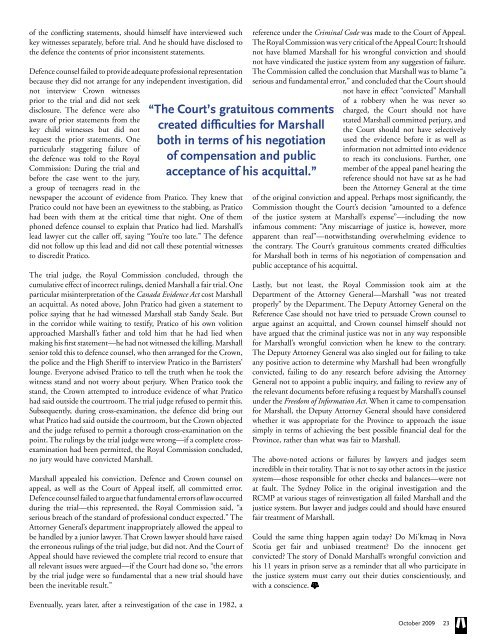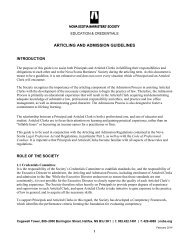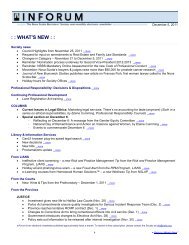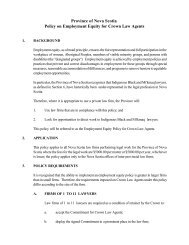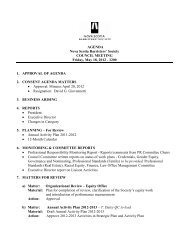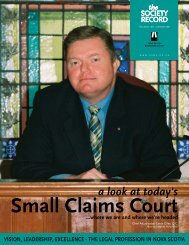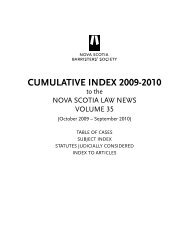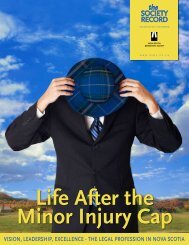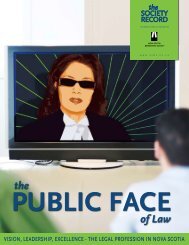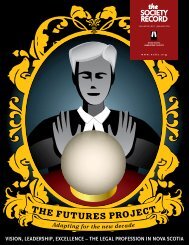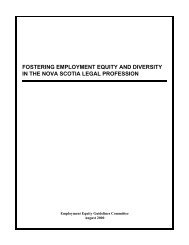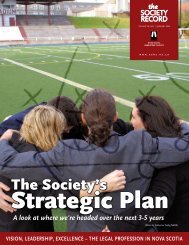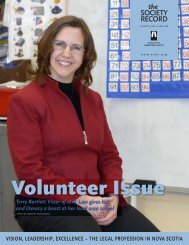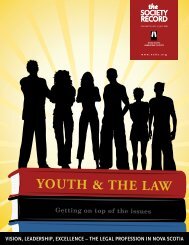SR Vol 27 No 4, October 2009 - Nova Scotia Barristers' Society
SR Vol 27 No 4, October 2009 - Nova Scotia Barristers' Society
SR Vol 27 No 4, October 2009 - Nova Scotia Barristers' Society
- No tags were found...
You also want an ePaper? Increase the reach of your titles
YUMPU automatically turns print PDFs into web optimized ePapers that Google loves.
of the conflicting statements, should himself have interviewed suchkey witnesses separately, before trial. And he should have disclosed tothe defence the contents of prior inconsistent statements.Defence counsel failed to provide adequate professional representationbecause they did not arrange for any independent investigation, didnot interview Crown witnessesprior to the trial and did not seekdisclosure. The defence were alsoaware of prior statements from thekey child witnesses but did notrequest the prior statements. Oneparticularly staggering failure ofthe defence was told to the RoyalCommission: During the trial andbefore the case went to the jury,a group of teenagers read in thenewspaper the account of evidence from Pratico. They knew thatPratico could not have been an eyewitness to the stabbing, as Praticohad been with them at the critical time that night. One of themphoned defence counsel to explain that Pratico had lied. Marshall’slead lawyer cut the caller off, saying “You’re too late.” The defencedid not follow up this lead and did not call these potential witnessesto discredit Pratico.“The Court’s gratuitous commentscreated difficulties for Marshallboth in terms of his negotiationof compensation and publicacceptance of his acquittal.”The trial judge, the Royal Commission concluded, through thecumulative effect of incorrect rulings, denied Marshall a fair trial. Oneparticular misinterpretation of the Canada Evidence Act cost Marshallan acquittal. As noted above, John Pratico had given a statement topolice saying that he had witnessed Marshall stab Sandy Seale. Butin the corridor while waiting to testify, Pratico of his own volitionapproached Marshall’s father and told him that he had lied whenmaking his first statement—he had not witnessed the killing. Marshallsenior told this to defence counsel, who then arranged for the Crown,the police and the High Sheriff to interview Pratico in the Barristers’lounge. Everyone advised Pratico to tell the truth when he took thewitness stand and not worry about perjury. When Pratico took thestand, the Crown attempted to introduce evidence of what Praticohad said outside the courtroom. The trial judge refused to permit this.Subsequently, during cross-examination, the defence did bring outwhat Pratico had said outside the courtroom, but the Crown objectedand the judge refused to permit a thorough cross-examination on thepoint. The rulings by the trial judge were wrong—if a complete crossexaminationhad been permitted, the Royal Commission concluded,no jury would have convicted Marshall.Marshall appealed his conviction. Defence and Crown counsel onappeal, as well as the Court of Appeal itself, all committed error.Defence counsel failed to argue that fundamental errors of law occurredduring the trial—this represented, the Royal Commission said, “aserious breach of the standard of professional conduct expected.” TheAttorney General’s department inappropriately allowed the appeal tobe handled by a junior lawyer. That Crown lawyer should have raisedthe erroneous rulings of the trial judge, but did not. And the Court ofAppeal should have reviewed the complete trial record to ensure thatall relevant issues were argued—if the Court had done so, “the errorsby the trial judge were so fundamental that a new trial should havebeen the inevitable result.”Eventually, years later, after a reinvestigation of the case in 1982, areference under the Criminal Code was made to the Court of Appeal.The Royal Commission was very critical of the Appeal Court: It shouldnot have blamed Marshall for his wrongful conviction and shouldnot have vindicated the justice system from any suggestion of failure.The Commission called the conclusion that Marshall was to blame “aserious and fundamental error,” and concluded that the Court shouldnot have in effect “convicted” Marshallof a robbery when he was never socharged, the Court should not havestated Marshall committed perjury, andthe Court should not have selectivelyused the evidence before it as well asinformation not admitted into evidenceto reach its conclusions. Further, onemember of the appeal panel hearing thereference should not have sat as he hadbeen the Attorney General at the timeof the original conviction and appeal. Perhaps most significantly, theCommission thought the Court’s decision “amounted to a defenceof the justice system at Marshall’s expense”—including the nowinfamous comment: “Any miscarriage of justice is, however, moreapparent than real”—notwithstanding overwhelming evidence tothe contrary. The Court’s gratuitous comments created difficultiesfor Marshall both in terms of his negotiation of compensation andpublic acceptance of his acquittal.Lastly, but not least, the Royal Commission took aim at theDepartment of the Attorney General—Marshall “was not treatedproperly” by the Department. The Deputy Attorney General on theReference Case should not have tried to persuade Crown counsel toargue against an acquittal, and Crown counsel himself should nothave argued that the criminal justice was not in any way responsiblefor Marshall’s wrongful conviction when he knew to the contrary.The Deputy Attorney General was also singled out for failing to takeany positive action to determine why Marshall had been wrongfullyconvicted, failing to do any research before advising the AttorneyGeneral not to appoint a public inquiry, and failing to review any ofthe relevant documents before refusing a request by Marshall’s counselunder the Freedom of Information Act. When it came to compensationfor Marshall, the Deputy Attorney General should have consideredwhether it was appropriate for the Province to approach the issuesimply in terms of achieving the best possible financial deal for theProvince, rather than what was fair to Marshall.The above-noted actions or failures by lawyers and judges seemincredible in their totality. That is not to say other actors in the justicesystem—those responsible for other checks and balances—were notat fault. The Sydney Police in the original investigation and theRCMP at various stages of reinvestigation all failed Marshall and thejustice system. But lawyer and judges could and should have ensuredfair treatment of Marshall.Could the same thing happen again today? Do Mi’kmaq in <strong>No</strong>va<strong>Scotia</strong> get fair and unbiased treatment? Do the innocent getconvicted? The story of Donald Marshall’s wrongful conviction andhis 11 years in prison serve as a reminder that all who participate inthe justice system must carry out their duties conscientiously, andwith a conscience.<strong>October</strong> <strong>2009</strong> 23


